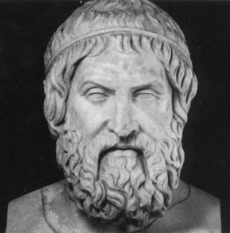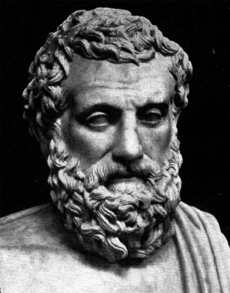
Aeschylus 525-456 BC
Aeschylus (pictured) is the first Ancient Greek playwright whose work still survives to this day, though sadly we only have seven of his estimated seventy to ninety plays. He is described as the ‘father of tragedy’ both for the earliness of his work and his innovations to the art. According to Aristotle it was Aeschylus who added a second actor, besides the chorus, which allowed for more interaction on stage and character development. He was also the first playwright to present plays in a trilogy, a form which became popular with later playwrights. Only one of his trilogies survives, known as the Orestia, including the play Agamemnon, which tells the story of Clytemnestra’s plot to murder her husband in revenge for the sacrifice of their daughter.
Legend has it that Aeschylus worked in a vineyard as a youth, until the god Dionysus appeared and commanded him to begin writing plays instead. He immediately did so, and saw the first performance of his work in 499 BC. His first victory at the City Dionysia competition came later, in 484 BC. The earliest surviving of Aeschylus’ plays is The Persians, which was first performed in 472 BC and won first place in the competition. It concerned the Persians’ second invasion of Greece, and is also the only surviving classical Greek tragedy which deals with contemporary events. Aeschylus apparently died when an eagle dropped a tortoise onto his head, mistaking it for a rock on which to break the shell!

Sophocles 497-406 BC
Only seven of Sophocles’ (pictured) one hundred and twenty three plays survive. He was an incredibly successful playwright, competing in thirty competitions and winning twenty four, never coming less than second place. His first triumph came in 468 BC when he placed first in the City Dionysia, defeating even Aeschylus himself. Sophocles was responsible for adding yet another character to his plays, allowing even further character development and the possibility of conflict between actors on the stage. Even Aeschylus himself added a third actor to his later plays.
Aristotle used Sophocles’ Oedipus the King as an example of the highest achievement in tragedy. This is the foremost of the Theban Plays, and tells the story of a king who killed his father and married his mother without realising they were his parents. This story later formed the basis of one of Sigmund Freud’s most well-known theories of child development. Sophocles is said to have died while trying to recite a particularly long line from his Antigone without taking a breath.
Euripedes 408-406 BC
Eighteen of Euripedes’ ninety-two plays survive. He was the least successful of the ancient tragedians, winning only five competitions. He first competed in the City Dionysia in 455 BC, one year after the death of Aeschylus, but didn’t win first prize until 441 BC. However, Euripedes is remembered for his controversial and experimental style. He preferred to depict traditional mythological heroes as if they were normal people caught up in extraordinary circumstances. He also exhibited sympathy towards victims of society. His Trojan Women was critical of Athenian imperialism.
Images: http://static1.squarespace.com/static/52bc675ae4b0207b1fe5b00e/t/53725915e4b07b722fd92ba0/1400002838700/
http://uwpress.wisc.edu/presskits/images/Sophocles_author_RGB.j

0 Comment:
Be the first one to comment on this article.